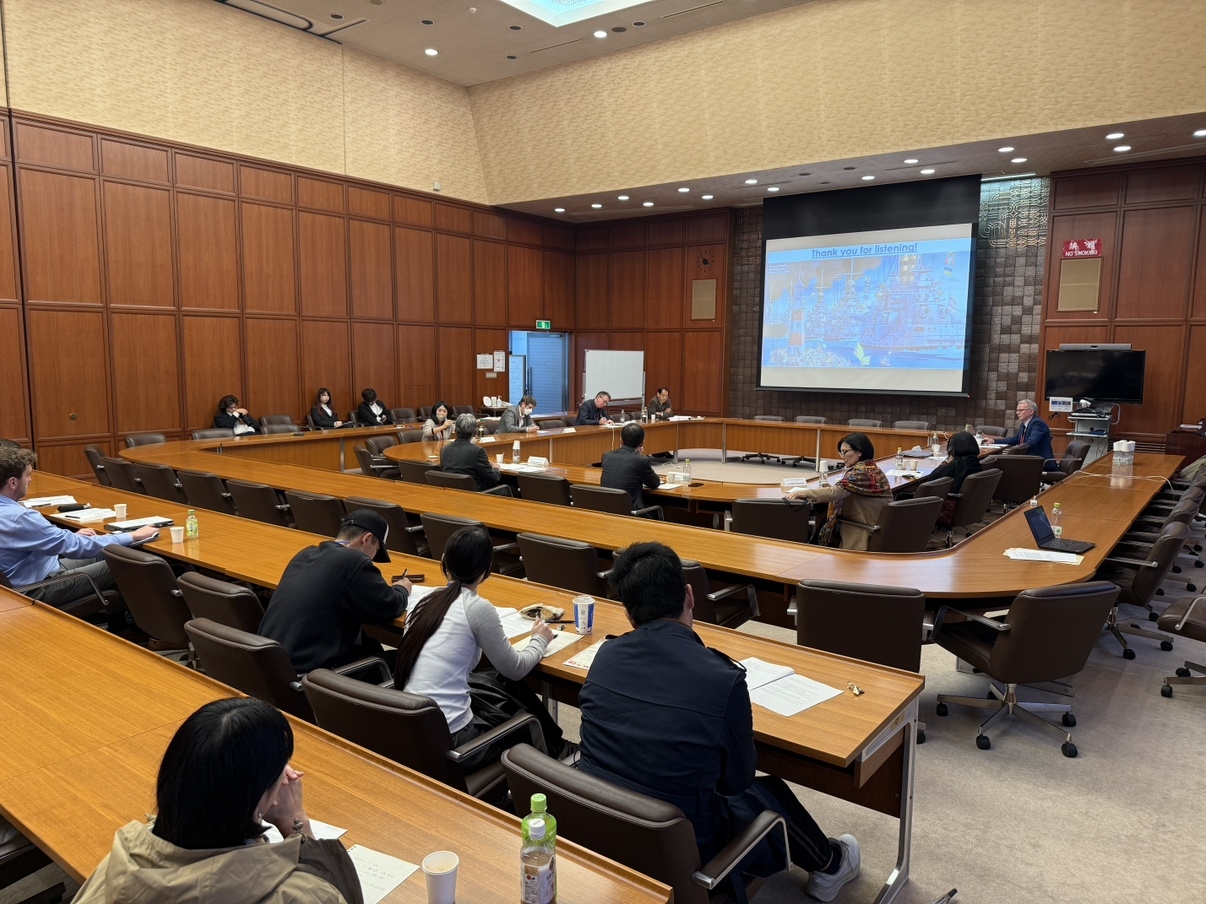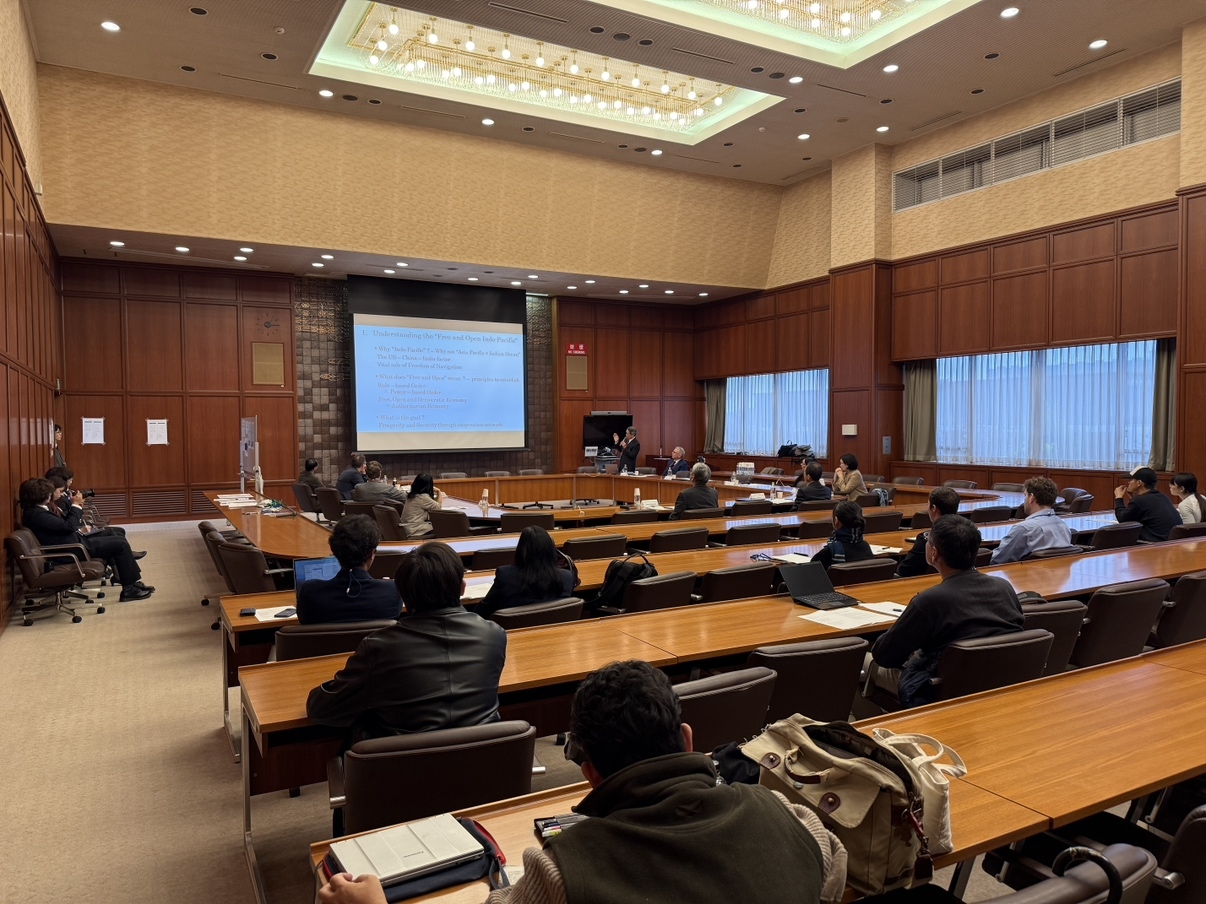アジア地域研究科 2025年度国際会議の実施報告について
去る2025年10月25日、アジア地域研究科は国際関係学部現代アジア研究所との共催で、東松山キャンパスにおいて国際会議を開催しました。テーマは、「荒波を進むアジア-日本が提唱する「自由で開かれたインド太平洋(FOIP)」戦略に対する関係諸国の対応-」でした。
この会議では、世界各地を出身地とする内外のパネリストによる報告や問題提起が行われました。また、パネリストだけでなく、学生や一般参加者を含む参加者全員で、激化する米中間の経済的競争、ロシア・ウクライナ戦争、ガザ紛争という世界的な危機の中で、インド太平洋地域においてどのような地域協力の可能性があるのかについて検討をしました。会議は3つのセッションに分かれ、第一のセッションでは、須田敏彦研究科委員長の開会の挨拶に続いて司会であるギャレン・ムロイ教授がインド太平洋地域の特性とFOIPの背景を説明しました。そして、以下のパネリストにより、平和的な貿易と外交を実現する上でアジア諸国やその他の国々が直面している問題の報告がなされました。また、日本が提唱する「自由で開かれたインド太平洋」(FOIP)アプローチの説明がされた後、FOIPアプローチがこの問題解決に資する可能性について議論をしました。各セッションのパネリストの報告に続いて、国際関係学部の兪敏浩教授、松本弘教授のコメントがなされ、パネリストだけでなく学生や一般参加者からも、米国や中国との関係をどのように管理するか、貿易戦争の影響をどのように軽減するか、関係国に対する日本の武器輸出の影響、地域諸国が認識するリスクの性質を評価する方法、高市新内閣の成立がもたらす影響などについて、活発な質問や議論がありました。
問題提起や議論の内容は多様で意見の違いもあり、統一した結論には至りませんでした。しかしこの会議は発足したばかりの高市早苗氏を首相とする新内閣がFOIPを外交の柱に据えたことなどから、大変タイムリーでした。また問題の多様さや複雑さに対する参加者の理解を深め、アジア地域における平和的な秩序の構築に向け、アジア地域研究科が掲げるフィールドレベルでの今後の取り組みにつながる有意義な国際会議となりました。
パネリスト(発表順)
倉井 高志 氏:元駐パキスタン・ウクライナ日本大使/成蹊大学 特別客員教授
マリー・ラル 氏:ユニバーシティ・カレッジ・ロンドン 教育学研究所教授
アイグル・クルナザロバ 氏:多摩大学 グローバルスタディーズ学部教授
松岡 美里 氏:帝京大学 外国語学部准教授
ベンジャミン・アシオーン 氏:早稲田大学 大学院アジア太平洋研究科講師
ポール・チェンバレン 氏:オーストラリア国立大学/カナダ国防省
International Symposium Held in October 2025
(Original text by Professor Garren Mulloy, revised by Toshihiko Suda)
On October 25, 2025, the Graduate School of Asian Area Studies, in collaboration with the Institute of Contemporary Asian Studies, Faculty of International Relations, held an international symposium at the Higashi-Matsuyama Campus. The theme of the symposium was “Asia Navigating Troubled Waters: Regional Actors’ Engagement with Japan’s ‘Free and Open Indo-Pacific (FOIP)’ Approach.”
At this event, panelists from Japan and abroad presented their research and raised critical questions concerning the theme. Together with students and members of the public, the participants examined how regional cooperation in the Indo-Pacific might be fostered amid intensifying global crises, such as the growing economic rivalry between the United States and China, the Russia–Ukraine war, and the conflict in Gaza.
The symposium was organized into three sessions. Following opening remarks by Professor Toshihiko Suda, Dean of the Graduate School of Asian Area Studies, the moderator, Professor Garren Mulloy, provided an overview of the Indo-Pacific region and the background of Japan’s FOIP strategy. Subsequently, a series of panel presentations addressed the challenges faced by Asian and other nations in pursuing peaceful trade and diplomacy. After an outline of Japan’s FOIP initiative, discussions focused on how the FOIP approach might contribute to resolving these issues.
Following each session’s presentations, Professors Minho Yoo and Hiroshi Matsumoto from the Faculty of International Relations offered their comments. A lively discussion ensued, involving not only the panelists but also students and general participants. Questions and debates addressed a wide range of topics, including how to manage relations with the United States and China, how to mitigate the effects of trade wars, the implications of Japan’s defense equipment exports, methods of assessing the risks perceived by regional countries, and the potential impact of the newly inaugurated Prime Minister Sanae Takaichi’s administration.
While the discussions revealed a diversity of perspectives and did not lead to a unified conclusion, the symposium proved to be both timely and significant—particularly given that the newly formed Takaichi Cabinet had just positioned the FOIP as a central pillar of Japan’s foreign policy. The event deepened participants’ understanding of the complex issues facing the region and provided valuable insights that will inform the Graduate School’s future field-based initiatives aimed at fostering a peaceful regional order in Asia.
Speakers:
Ambassador H.E. Kurai Takashi, former Ambassador of Japan to Pakistan and Ukraine,
Special Visiting Professor, Seikei University.
Prof. Marie Lall, Institute of Education, University College London
Prof. Aigul Kulnazarova, Faculty of Global Studies, Tama University
Dr. Misato Matsuoka, Department of Language Studies, Teikyo University
Dr. Ben Ascione, Graduate School of Asia-Pacific Studies, Waseda University
Mr. Paul Chamberlain, Australian National University/ Department of National Defence, Canada






